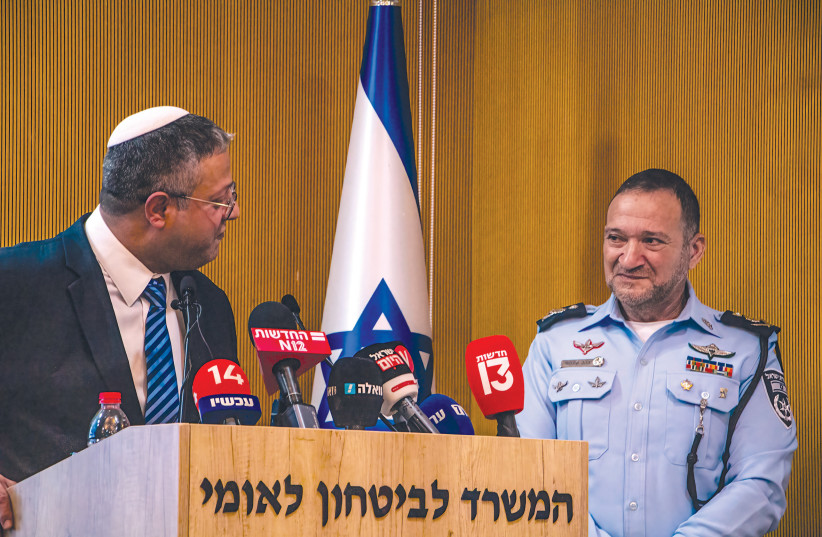The scenes following Friday’s terrorist car-ramming attack at a bus stop at Jerusalem’s Ramot Junction were heartbreaking. Two young brothers, Ya’akov Pally, six, and Asher, eight, were killed, along with Shlomo Laderman, a 20-year-old newly married yeshiva student. The attack was carried out by Hussein Karaka, a 31-year-old Palestinian who lived in the nearby Isawiya neighborhood of east Jerusalem. He was shot and killed by an off-duty police officer.
The ramming attack came just two weeks after seven people were killed in a terror attack outside a synagogue in Jerusalem’s Neveh Ya’acov neighborhood.
In between, there were other thwarted attacks and attacks that failed.
There is a growing sense of insecurity and even CIA Director William Burns last week warned that the situation reminded him of the beginning of the Second Intifada, the awful wave of Palestinian terror attacks that started in 2000.
Itamar Ben-Gvir: On the scene after every terror attack
Over the years, the public has become used to the sight of Otzma Yehudit head Itamar Ben-Gvir visiting the scene after terror attacks, making declarations and often whipping up the crowd. Ben-Gvir, for example, rushed to the site following the double bombings at the entrance to Jerusalem and Ramot in November.

There is, however, one major difference. Then, he was still an ordinary MK and before that just a well-known rabble-rouser. Now he is the national security minister with, as part of the coalition agreement, broader jurisdiction over the police.
Therefore, what Ben-Gvir says now, as a member of the government, has a completely different weight and significance. Ben-Gvir entered the cabinet with the slogan “returning sovereignty” and a set idea of how things should be done. But he was not prepared to wait and learn the facts as part of the government and as someone who is privy to the broader picture.
It is natural for Ben-Gvir to want to please his voting base and to carry out policies he has long spoken about, but as a member of government, he is now in charge. There is no one to blame anymore for why something doesn’t get done, except himself.
After the ramming attack, the national security minister wrote on Twitter that his response would be to legislate a death penalty for terrorists, to put roadblocks around the terrorist’s east Jerusalem neighborhood and check every car. Later, he said that he had ordered the police to prepare for “Operation Defensive Shield 2” in east Jerusalem.
Ben-Gvir and Israel Police Commissioner Kobi Shabtai were caught on camera in a heated argument at the scene of the attack. Ben-Gvir must have forgotten that he does not have the exclusive right as a minister to determine police policy, nor can he use the Border Police as his private army.
As The Jerusalem Post’s Eliav Breuer noted yesterday, Ben-Gvir’s gaffe exposed his lack of knowledge of basic decision-making on matters of security, as well as a lack of familiarity with basic timelines to prepare for large-scale security operations.
Ben-Gvir’s statements are disturbing. A national security minister should not be shooting his mouth off. Imposing a closure on a neighborhood in our nation’s capital because the terrorist happens to rent an apartment there is collective punishment. It is morally unacceptable and its effectiveness is also questionable.
Nonetheless, this does not mean that all of Ben-Gvir’s suggestions should be dismissed, and it certainly does not relieve the government of the responsibility of taking steps to improve the security situation.
A major operation might be needed but it can only happen after careful planning, establishing clear goals, preparing an exit plan, and how to move ahead after the operation. There are additional steps that can be taken – rescinding state benefits for families who receive “pay for slay” compensation from the Palestinian Authority, cracking down on incitement in mosques and in schools, and ensuring that schools that are receiving municipal and government funding are vetted and do not employ staff who foster hate and martyrdom.
Ben-Gvir is a senior minister in the government. He cannot act as a loose cannon. Prime Minister Benjamin Netanyahu must make that clear. Sealing the home of the terrorist might provide a quick feeling of accomplishment but that is not a strategy to fight terrorism. And that is exactly what Israel needs – a strategy.
